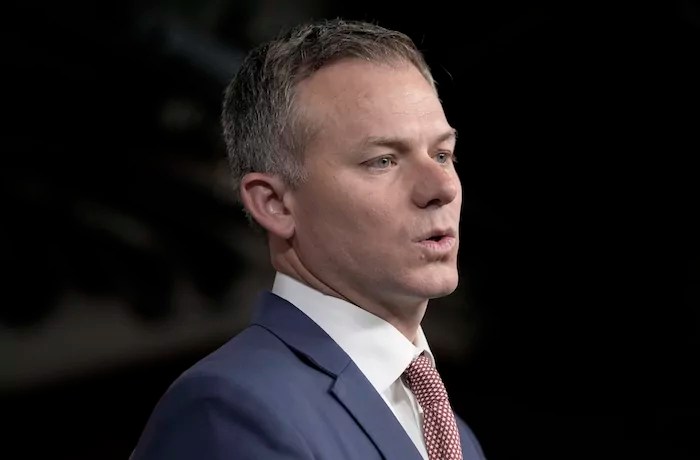


Rep. Blake Moore (R-UT) is pushing for his plan to more than double the child tax credit to be included in the major fiscal overhaul that Republicans are working on this year.
In a Wednesday interview with the Washington Examiner, Moore said he thinks there will be interest in his bill within the Republican conference. As populism is increasingly embraced within the GOP, an increasing number of lawmakers have called for a larger child tax credit and more economic incentives for family creation.
Of note, he filed the bill this week as House Republicans begin to deliberate on the fiscal package, which is an overhaul that Republicans plan to pass through budget reconciliation, a legislative process that allows for bills to bypass the filibuster and pass with only a simple majority in the Senate.
“I can’t predict how this plays out within the reconciliation package,” Moore said from his office. “We’re obviously going to push for it. I think that the Republican base … there’s interest there.”
Moore’s bill, the Family First Act, increases the child tax credit amount from the current $2,000 level to $4,200 for families with a child up to age 5. The credit would be $3,000 for families with a child between 6 and 17.
The bill also creates a $2,800 tax credit for pregnant mothers. Moore said it is an important component because of all the changes that happen during the pregnancy and child-raising process.
Democrats temporarily expanded the child tax credit in 2021 and removed work requirements — meaning that there was no income threshold to receive the credit. Moore’s bill sets the income threshold at $20,000 to receive the full child tax credit amount, or at least $10,000 for the full credit during pregnancy. Those thresholds would be indexed to inflation.
The cost of the bill is fully offset by consolidation and simplification of the earned income tax credit, repealing the dependent portion of the personal exemption, and maintaining the $10,000 cap on state and local tax deductions, among other provisions.
Moore said what is needed in U.S. society is stronger families and he hopes that boosting the child tax credit would help.
“Our society is different now and we need to make sure that we’re not losing that core part about our culture, that the next generation is hugely important,” Moore said.
“We want to make sure that we’re creating, incentivizing, good, strong family values because they create good, strong economies,” he said.
The Washington Examiner spoke to freshman Rep. Riley Moore (R-WV) on Wednesday about the child tax credit. He said he would like to see the credit expanded even more, perhaps up to $5,000.
“I think we need to have more pro-family policies in this country,” Riley Moore said.
Some child tax credit proponents say it is necessary for demographic reasons, as Vice President-elect J.D. Vance has talked about. For instance, in interviews with the Washington Examiner, both Kari Lake, who ran for Senate in Arizona, and Sen. Bernie Moreno (R-OH) brought up the issue.
The total fertility rate, or the average number of children a woman will have in her lifetime, plummeted to 1.62 in 2023, the lowest level in a century, according to the Centers for Disease Control and Prevention.
The rate has trended down since 2007, when the total fertility rate reached the replacement rate of 2.1 births per woman. Demographers define the replacement rate as the number of births that will keep a population stable, with no growth or decline.
One argument for more spending on family creation is that eventually a growing population will entail greater economic output and higher tax revenues.
“I’m absolutely concerned about it,” Blake Moore said. “I mean, I guess it’s tough to talk about this in economic terms because when I see my family and the four boys and our life and everything, it’s not about the economy, it’s about our faith and family … but we need to be considerate of the fact that we’re not replacing our birth rate, and that’s hitting our participation rate and it’s not a good outlook for the next 50-year outlook.”
CLICK HERE TO READ MORE FROM THE WASHINGTON EXAMINER
The Utah Republican doesn’t expect much open opposition to his bill from the Republican conference but said its fate and inclusion in the reconciliation package will come down to how many lawmakers end up getting on board.
“I don’t think there is pushback against it. It’s to the point of how much interest can we get to do it,” the congressman said.
